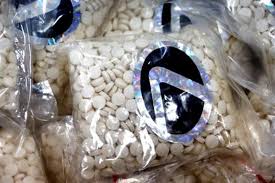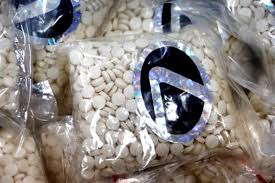
The Syrian crisis is being viewed as an entangled war between Syrian government, the rebel forces and Islamist fundamentalists – Isis, aimed to gain regional dominance based on an overlapping mixture of ideologies and political agendas.
But experts say that this is only the reason as is evident from the surface. Many analysts suspect, the fighting in Syria is powered by something else: Captagon
Captagon is a tiny, highly addictive pill produced in Syria and widely available across the Middle East. Huge amount of money is associated with its illegal sale that funnels hundreds of millions of dollars back into the war-torn country's black-market economy each year. This money is suspected to be giving the militias access to new arms, fighters and the ability to keep the conflict boiling, reports The Guardian.
“Syria is a tremendous problem in that it’s a collapsed security sector, because of its porous borders, because of the presence of so many criminal elements and organized networks,” the U.N. Office on Drugs and Crime regional representative, Masood Karimipour, said Voice of America recently.
“There’s a great deal of trafficking being done of all sorts of illicit goods — guns, drugs, money, people. But what is being manufactured there and who is doing the manufacturing, that’s not something we have visibility into from a distance,” Karimipour adds.
However there is a section of analysts and drug experts who say that Captagon is far from new and this is not the first time it is been in the news. They believe that the problem is bigger than Syria.
Captagon is one of several brand names for the drug compound fenethylline hydrochloride. This drug is not new in the world of drugs as the Pharmaceutical Manufacturing Encyclopedia notes its debut in 1961. It was first manufactured by Chemiewerk Homburg, a subsidiary of specialty chemicals company Degussa. According to the Merck Index, the patent for its production dates to 1962.
Captagon belongs to the family of drugs known as amphetamines. This groupd of drugs is chemically related to natural neurotransmitters like dopamine and epinephrine (aka adrenaline) even though they are human-made. Cosumptionfo the drug results in the production of amphetamine itself, as well as to theophylline by the metabolism in the human body which breaks down the drug. Theophylline is a molecule that naturally occurs in small amounts in tea and that also has cardiac stimulating activity.
Alertness is increased, concentration is boosted and physical performance is enhanced giving a feeling of well-being to an individual due to the simulation of the central nervous system by amphetamine drugs.
Users of the drug described the feeling to BBC in a documentary aired earlier this year where one of the users defined the feeling as: “I felt like I own the world, high, like I have power nobody has. A really nice feeling”.
“There was no fear anymore after I took Captagon,” another user told the film crew.
"You can't sleep or even close your eyes, forget about it," said a Lebanese user who also appeared in the BBC Arabic documentary. "And whatever you take to stop it, nothing can stop it," the user added.
Reuters had reported that the Syrian government forces and rebel groups each said that the other uses Captagon to endure protracted engagements without sleep, while clinicians say ordinary Syrians are increasingly experimenting with the pills, which sell for between $5 and $20.
(Source:www.forbes.com & www.washingtonpost.com)
But experts say that this is only the reason as is evident from the surface. Many analysts suspect, the fighting in Syria is powered by something else: Captagon
Captagon is a tiny, highly addictive pill produced in Syria and widely available across the Middle East. Huge amount of money is associated with its illegal sale that funnels hundreds of millions of dollars back into the war-torn country's black-market economy each year. This money is suspected to be giving the militias access to new arms, fighters and the ability to keep the conflict boiling, reports The Guardian.
“Syria is a tremendous problem in that it’s a collapsed security sector, because of its porous borders, because of the presence of so many criminal elements and organized networks,” the U.N. Office on Drugs and Crime regional representative, Masood Karimipour, said Voice of America recently.
“There’s a great deal of trafficking being done of all sorts of illicit goods — guns, drugs, money, people. But what is being manufactured there and who is doing the manufacturing, that’s not something we have visibility into from a distance,” Karimipour adds.
However there is a section of analysts and drug experts who say that Captagon is far from new and this is not the first time it is been in the news. They believe that the problem is bigger than Syria.
Captagon is one of several brand names for the drug compound fenethylline hydrochloride. This drug is not new in the world of drugs as the Pharmaceutical Manufacturing Encyclopedia notes its debut in 1961. It was first manufactured by Chemiewerk Homburg, a subsidiary of specialty chemicals company Degussa. According to the Merck Index, the patent for its production dates to 1962.
Captagon belongs to the family of drugs known as amphetamines. This groupd of drugs is chemically related to natural neurotransmitters like dopamine and epinephrine (aka adrenaline) even though they are human-made. Cosumptionfo the drug results in the production of amphetamine itself, as well as to theophylline by the metabolism in the human body which breaks down the drug. Theophylline is a molecule that naturally occurs in small amounts in tea and that also has cardiac stimulating activity.
Alertness is increased, concentration is boosted and physical performance is enhanced giving a feeling of well-being to an individual due to the simulation of the central nervous system by amphetamine drugs.
Users of the drug described the feeling to BBC in a documentary aired earlier this year where one of the users defined the feeling as: “I felt like I own the world, high, like I have power nobody has. A really nice feeling”.
“There was no fear anymore after I took Captagon,” another user told the film crew.
"You can't sleep or even close your eyes, forget about it," said a Lebanese user who also appeared in the BBC Arabic documentary. "And whatever you take to stop it, nothing can stop it," the user added.
Reuters had reported that the Syrian government forces and rebel groups each said that the other uses Captagon to endure protracted engagements without sleep, while clinicians say ordinary Syrians are increasingly experimenting with the pills, which sell for between $5 and $20.
(Source:www.forbes.com & www.washingtonpost.com)





